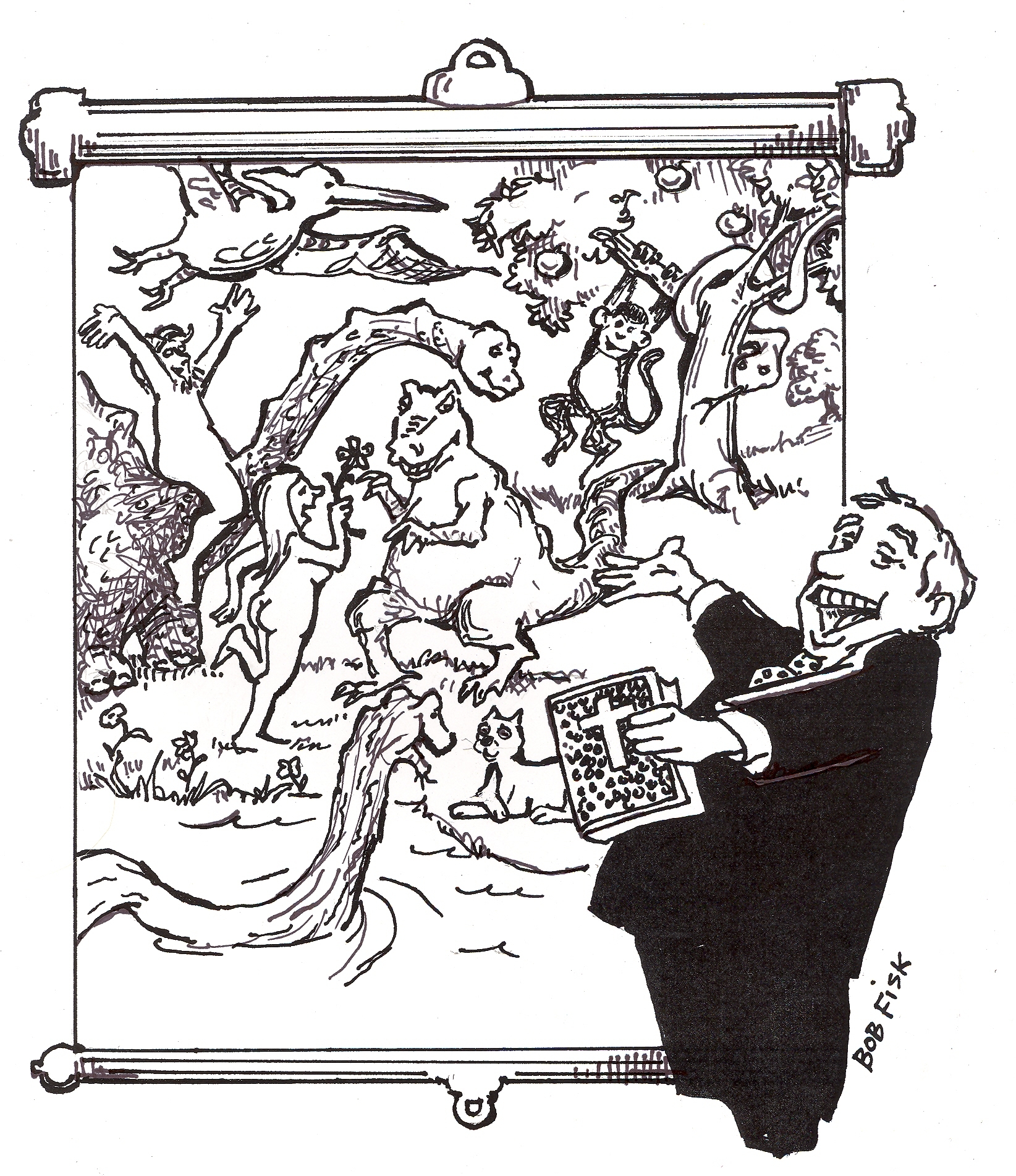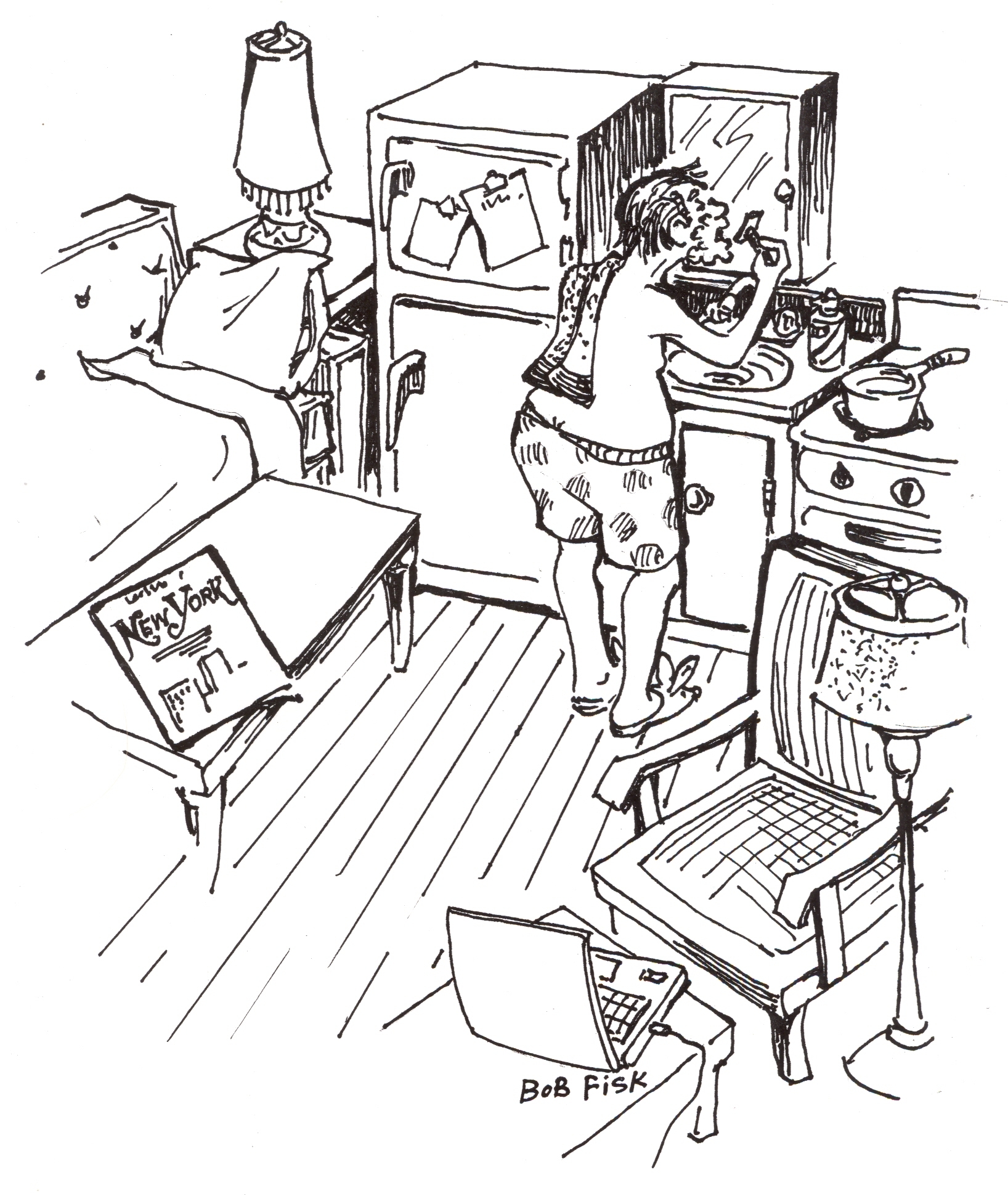The HyperTexts
Another Two Sections from A Gallery of Ethopaths by Joseph S. Salemi
with illustrations by Bob Fisk
I recently had a long exchange of e-mails with Michael
Burch, the webmaster of this site, on various religious and aesthetic issues.
Concerning some things, after exhaustive debate, Mike and I agreed to
disagree. But we had no difficulty at all in jointly asserting that most poets today are wimps and conformists.
[Please allow me to interject that I certainly do agree with Joe that American poets
should strenuously exercise our hard-won freedoms of speech and dissent. As many
readers of The HyperTexts know, I have challenged poets to give us
their best poems on controversial subjects, as our Heresy Hearsay
page attests. But I tend to be more optimistic about human nature than Joe, and
my method is to challenge rather than berate poets. Joe's choices of words here
are his own, not mine. I don't believe that "most poets today are wimps and
conformists." That's what Joe believes. What I believe is that American poets
should (and will) follow in the tradition of heretics and truthtellers like
Blake, Shelley and Whitman, speaking boldly and forthrightly: the sooner, the
better. —Michael R. Burch, Editor, The HyperTexts]
I don’t know why this should be so. There isn’t a thin dime to be made off poetry, unless you count the
piddling little prizes that are offered here and there.
Absolutely nothing is riding on what we write, so why shouldn’t we
express our viewpoints as freely and as openly as we wish?
The film critic John Simon once pointed out that when an art form ceases
to bring a commercial return, it is then liberated, and can proceed to develop
its highest aesthetic potential. Well,
poets have never made money, so why in hell should they be as timorous as
untenured assistant professors? We are
free to say whatever we please in whatever manner we choose.
But we don’t. A tremendous
opportunity for aesthetic achievement is being ignored.
Consider the insufferable nerdiness of so many modern
poets: their pusillanimous ordinariness and vacuity and lack of interesting
character. Driven by a pathetic need to
be liked by as many people as possible, these types are always on their best
behavior. It’s this overanxious,
parent-pleasing conformism that I find the most offputting
characteristic of contemporary poets.
Go to any public reading and you’ll see what I mean: the hesitation, the
tentativeness, the barely audible voices, the self-deprecating humor, the
suppressed fear, the hypersensitivity to audience reaction … all this makes me
wonder if I’m listening to human beings or to androids.
Are there exceptions? Sure. But the exceptions are
increasingly exceptional. Poets—like everyone else in this over-regulated and security-camera-scanned world—are
learning to toe the line of what is acceptable and not acceptable.
Those who don’t are quietly sidelined and ignored.
And a great many of our self-appointed neo-Victorians think that this
situation is right and proper. “Poetry is
becoming responsible,” one of them sniffed at a forum recently.
It wasn’t always this way.
Think of the long string of past poets who lived what can only be called
irregular lives, and who dissented audibly from the received opinions of their
times. Villon was a thief and a
scapegrace. Marlowe was a blasphemer and
an atheist. Ben Jonson was a murderer, Rochester a pornographer,
Byron a rake. Blake’s attitude towards
the God of the Old Testament was one of contempt and loathing, and he was
arrested once for political subversion.
Poe was an alcoholic, Swinburne a sadomasochist and pagan sensualist, Dowson a
hashish-smoker and a would-be pedophile.
Rimbaud dealt in gun-running and slave-trading.
Even Shakespeare, who is often held up as a model of bourgeois propriety,
led a racy private life in London while leaving his boring family in Stratford to their own devices.
The list could go on and on.
Could poets do stuff like that today?
Sure, but at a price. Your legal
fees, you alimony, and your medical bills would be overwhelming.
It’s much easier to teach in some little community college dungheap, run
workshops, and scrounge for grant money.
Your poetic life can revolve around faculty meetings, conferences, and the
occasional coed groupie. It’s a lot safer
than gun-running and pedophilia.
Think of the trouble Baudelaire had when he published
Les Fleurs du Mal. Conventional and
bien-pensant French opinion was outraged.
Would anyone risk that today?
Aeneas Silvius, the Renaissance savant who later became Pope Pius II, wrote a
hysterically funny and bawdy Latin verse drama about prostitution.
(It’s called Chrysis—look it up).
What poet with any hopes for a higher position would dare do that now?
The great Ovid took flak from the Emperor Augustus for his racier books
like Amores and Ars Amatoria, and he was eventually exiled to Tomi
for “indiscretions.” The closest thing to
that today is Amiri Baraka getting canned by the State of New Jersey.
Wimp poets write wimpish poetry.
And that is what strikes me as particularly troublesome in a great deal
of modern poetry. Poets are
unwilling to say anything really provocative and potentially trouble-making.
They won’t address an issue that might cause controversy.
Instead, what you get is a totally bogus courage that manifests itself in
the writing of poems against the war, against oppression, against racism, or
against any other conveniently safe target that helps you make a fashion
statement about your own enlightened liberalism.
That’s about as daring and courageous as combing your hair.
Here are two sections of A Gallery of Ethopaths that
actually go after real targets: the Protestant fundamentalist proponents of
Creationism, and the stupid out-of-towners who come to infest Manhattan.
They are accompanied by the illustrations of Bob Fisk. Will these poems make enemies? I
sure hope so.

Creationist Fanatics
It’s time to wag some savage tongue
At those who think the earth is young.
“Creationists” are what they’re called
And frankly, you would be appalled
At what these yahoo dorks believe:
Apparently, they can’t conceive
An age beyond six thousand years
For all the planetary spheres.
According to this witless herd
The Bible’s the inerrant word
Of God Himself, and you had better
Believe it right down to the letter.
He made the earth and all we see
Around four-thousand-four B.C.
In one short week of frantic bustle
(God, you know, can really hustle).
The animals, the plants, and man
Came fully formed from God’s own hand
Without the help of evolution.
Jerks in thrall to this delusion
Think fossils are an evil ruse
Placed by Satan to confuse
Mankind, and foster non-belief,
Thus leading to eternal grief.
Creationists say dinosaurs
Lived with cave men, and their roars
Could be heard on Noah’s Ark,
And Eden was Jurassic Park
Where T. Rex and his monstrous ilk
Walked about as mild as milk.
Brontosaurus browsed the trees
With Eve and Adam at his knees,
And our first parents washed their dishes
In streams that held pre-Cambrian fishes,
For all was made at once, they croak:
God did it at a single stroke.
As for Darwin, these folks claim
He’s now awash in penal flame,
And all who take his devilish path
Will join him in that fiery bath.
It really takes your breath away
That anyone with brains could say
We can ignore the age of rocks
That serve as stratigraphic clocks,
The speed of light, and isotopes
That prove (except to fundie dopes)
The earth’s age is at least four billion
Of our years, give or take some million,
Or that these crackpots can deny
That simpler life forms live and die
And give rise, after countless ages,
To changed ones in successive stages.
This shows the human mind is liable
To rot when it assumes the Bible
Is a text of literal fact.
The truth is that the Bible’s packed
With legends, myths, and allegories,
Fables and fictitious stories
Composed for a didactic purpose—
One can’t believe them on the surface.
These yarns were spun to pierce the skull
Of shepherds, nomads, and the dull
Mentality of unschooled peasants
For whom myth was the living presence
Of Yahweh and His sacred word.
But now, it’s mulishly absurd
To not admit these tales fantastic
Are just an arcane metaphrastic
Way of preaching to the masses
Who can’t see things through reason’s glasses.
This potpourri of Torah-tales
Is fictional, like Jonah’s whale,
Or Joshua’s trumpet, or the Flood,
The Red Sea parting, Abel’s blood,
Sodomites made blind and halt,
A woman turning into salt,
Hagar saved by magic water,
Jephthah chopping up his daughter,
Manna dropping from the skies,
And all those other pious lies.
The scriptures tell us how to live
But don’t presume they also give
Us scientific information
About the details of creation.
The Bible’s sacred text was penned
To teach us of our final end;
It only speaks symbolically
Of how existence came to be.
So if you live in regions raw
Like Tennessee or Arkansas,
Rural Georgia, Texarkana,
The fever swamps of Alabama,
Or in the stretch of Geisterwelt
That Mencken called the Bible Belt,
Or in some mental dormitory
Where preachers howl for God and Glory,
Confine yourself to prayerful moan,
And leave the scientists alone.Copyright © 2008 by Joseph S. Salemi

Living In Manhattan
A truly ethopathic need
Is that felt by the sicko breed
Of folks who love Manhattan’s isle
And who insist it’s worth their while
To pay a huge, outrageous rent
For lodgings where they’re tightly pent
Up in a twelve-by-twelve-foot room
As cramped and stifling as a tomb.
These dorks live in a studio
That costs them the same monthly dough
You’d pay to get a hotel suite
Outside New York. What a treat,
To live inside a crummy box
Protected by six burglar locks;
To be confined in quarantine
Like sailors in a submarine;
To choke on your own sweaty stink
And take baths in your kitchen sink;
To sleep upon a sofa bed
With not enough room for your head
While using a refrigerator
That holds three eggs and one tomato.
And all because you love Manhattan
And look down on the Bronxand Staten
Island, Queens, and such-like spots
As places worse than empty lots.
You think the city’s wild, vivacious,
Sexy, cool, and—goodness gracious!—
You wouldn’t want to miss all that
By living in a Brooklyn flat.
You long to be where things are “hot,”
Although you’re just a little snot
Who lives inside a walk-in closet
On short-term lease and huge deposit.
The home you’ve chosen is a cage,
But still, suppressing grief and rage,
You smile and say you’re quite content
With mini-space for maxi-rent.
And why? So
your return address
Can read “New York, New York.”I guess
You really are a bit retarded.
My prognosis? Well, it’s guarded—
Perhaps in twenty years or so
You’ll find out you’re a total schmo
Who could be living twice as nice
Some other place, for half the price.
Or else you’ll stay put and expire
While watching rents go higher and higher.
But since you are an ethopath
You lack what is called Sinn und Rat
In German—that is, brains and sense,
And so you are at great expense
To subsidize your private cell
In chic Manhattan’s crowded hell.
My God, what a prodigious joke!
My best advice to you?
Go choke.
There’s no prestige in mere locale—
Shall I say what you are? I shall:
A pompous little arriviste
As common as a strain of yeast;
A small-town schmuck who glows with pride
Because he’s on the posh West Side;
A cheap poseur who wants to chalk up
Points for his sleazy Soho walk-up;
A two-bit dancer-waitress-whore
With loft space on an upper floor.
These are the slaves of New York City
Whose mindlessness deserves no pity.
Copyright © 2008 by Joseph S. Salemi
The HyperTexts


